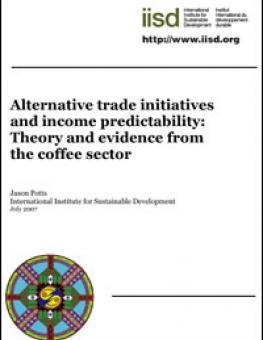
Alternative trade initiatives and income predictability: Theory and evidence from the coffee sector
Supply chain instruments, through the diverse social, economic and environmental criteria they specify, have the potential to reduce risk across a whole range of farmer activities, thereby setting a foundation for improved stability not just in price or revenue, but in income itself. Ultimately, it is this understated, and underrated, feature of private voluntary sustainability standards—namely their potential impacts on income stability—that arguably offers the greatest promise in promoting stability in farmer livelihoods and opportunities for sustainable development.
This paper begins with a brief overview of the general history of, and responses to, price volatility in the coffee sector. It then reviews the main elements of key private voluntary sustainability standards presently operating in the coffee sector, considering the theoretical and empirical links between such instruments and the various aspects of income stabilization (including price) in the coffee sector.
You might also be interested in
The State of BCAs 2025
As more countries boost their climate ambition, border carbon adjustments (BCAs) are emerging to curb carbon leakage, with the European Union, the United Kingdom, and others advancing their own mechanisms. This publication is the first of its kind taking stock of this trend.
February 2025 | Carbon Minefields Oil and Gas Exploration Monitor
In January 2025, 77 oil and gas exploration licences were awarded in seven different countries, with Norway leading in terms of embodied emissions.
Funding the Future
Practical recommendations for federal infrastructure programs with 14 criteria to better enable natural infrastructure in Canada.
Advancing Green Public Procurement in South Africa
This report analyzes practices and challenges of green public procurement in South Africa and provides recommendations for leveraging public spending to advance sustainability.